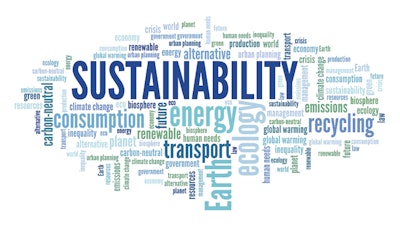
Kristin Bonham, regional vice president for DSM Animal Nutrition and Health in North America, has worked in agriculture all her life. Born and raised on a farm, she knows firsthand how producers care for the land and are constantly striving to make their production more sustainable. She joined DSM a little under a year ago and recently talked to Poultry International about how she believes poultry producers can produce yet more sustainably and why they need to do so.
CLEMENTS: The poultry industry is already seen as being amongst the most sustainable producers of animal protein, so why should it work to become more sustainable?
BONHAM: That’s a good point, there are a lot of things from a poultry standpoint that producers have done. But as the world’s population grows, we need to continue improving to meet this demand sustainably. There is growing demand for animal protein and poultry producers will play a big role in satisfying that.
For me, it is about how we can really collaborate with producers and help them be more efficient. One of the things that has really been fascinating for me, being new in this business, are the gains in efficiency that can be achieved. Feed enzymes and eubiotics, for example, can really help producers improve the digestibility of the feed.
I think that poultry is more sustainable, but how it can be more efficient with its resources, at the end of the day, is really the key point.

Kristin Bonham is passionate about helping producers become more sustainable and believes that embracing sustainability is the only way forward as environmental and demand pressures increase. | Kristin Bonham
CLEMENTS: Where are pressures to produce more sustainably coming from?
BONHAM: There isn’t really a day that goes by where you are not seeing some sort of tagline on sustainability, and this is due to a combination of factors.
The reality is climate change is happening. Consumers play a significant role, along with government regulations around the world, demanding sustainability and changes. And last but not least, there is the feed industry itself.
It’s a combination of factors, that is adding to the pressure to act now.
CLEMENTS: How can the average producer learn more about what it means to be sustainable?
BONHAM: There are some great resources. The United Nations Sustainable Development Goals are really great pointers towards some of the main challenges.
We launched our strategic initiative We Make it Possible, which is designed to help educate and provide real answers to the challenges facing the agriculture industry.
CLEMENTS: Are there simple steps that producers can take in the here and now to be more sustainable?
BONHAM: One of the most important things is just the conversations that we are having today – getting engaged in the conversation about the need for sustainability.
You can no longer think, “This is isn’t going to impact me in the future,” producers need to approach their businesses in a sustainable way now.
A lot starts with this mindset, but there are many different tools in the toolbox. Enzymes, for example, can make the feed that we have today more efficient. One of the other things that we can look at is alternative feed sources.
CLEMENTS: Looking long term, is it a case that producers must constantly alter how they produce in light of changing technologies and pressures?
BONHAM: The short answer to that is yes. If you think about how sustainability will develop, let’s say over the next five to 10 years, food systems will really need to transform to be fit for the future.
I think that people in general are increasingly conscious of the environmental and social impacts of their food choices, and we are going to have to think about that.
A more sustainable food system isn’t simple to develop, it takes time, and really requires transformation in a lot of areas. We need to look at new technologies with speed and agility to figure out how we can solve some of these things faster.
CLEMENTS: How can you reconcile sustainability with consumer perceptions of sustainability?
BONHAM: That’s one of the biggest challenges that we have to think about. It is really important that, as we approach sustainability conversations, we approach them at a level that relates to consumers.
When we talk about the environment, there are areas that are really important from a consumer standpoint, such as reducing emissions, that we need to address.
CLEMENTS: What would you say to proponents of eating better, but less meat?
BONHAM: I believe in balanced, healthy nutrition with animal proteins being a highly nutritious and key part of a balanced, healthy diet, but current estimates are for rising consumption. We are seeing that regions becoming more affluent are focusing on a meat diet. There is an estimate that 20% of meat is wasted – a huge quantity that could help feed the world without using more resources. Overall increased demand is going to call for our producers to produce more but using fewer resources.
As we think about sustainable production, it is the only way forward. We really need to have the mindset of now, we need to start being active on this, really stepping up. It is going to require innovation, working with, and listening to, consumers, and partnering to feed a growing population. What I feel passionate about is how can we do these things.


















